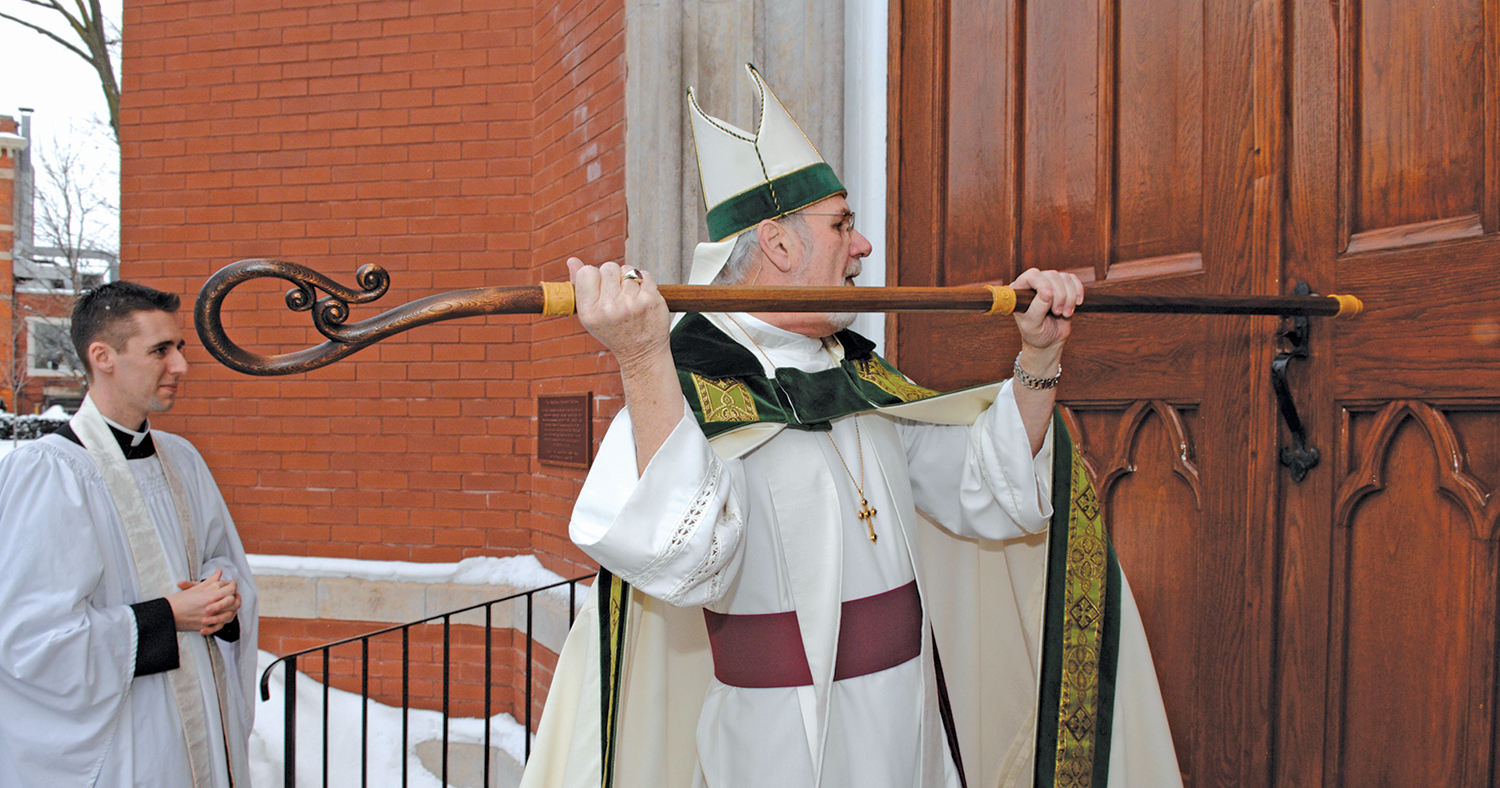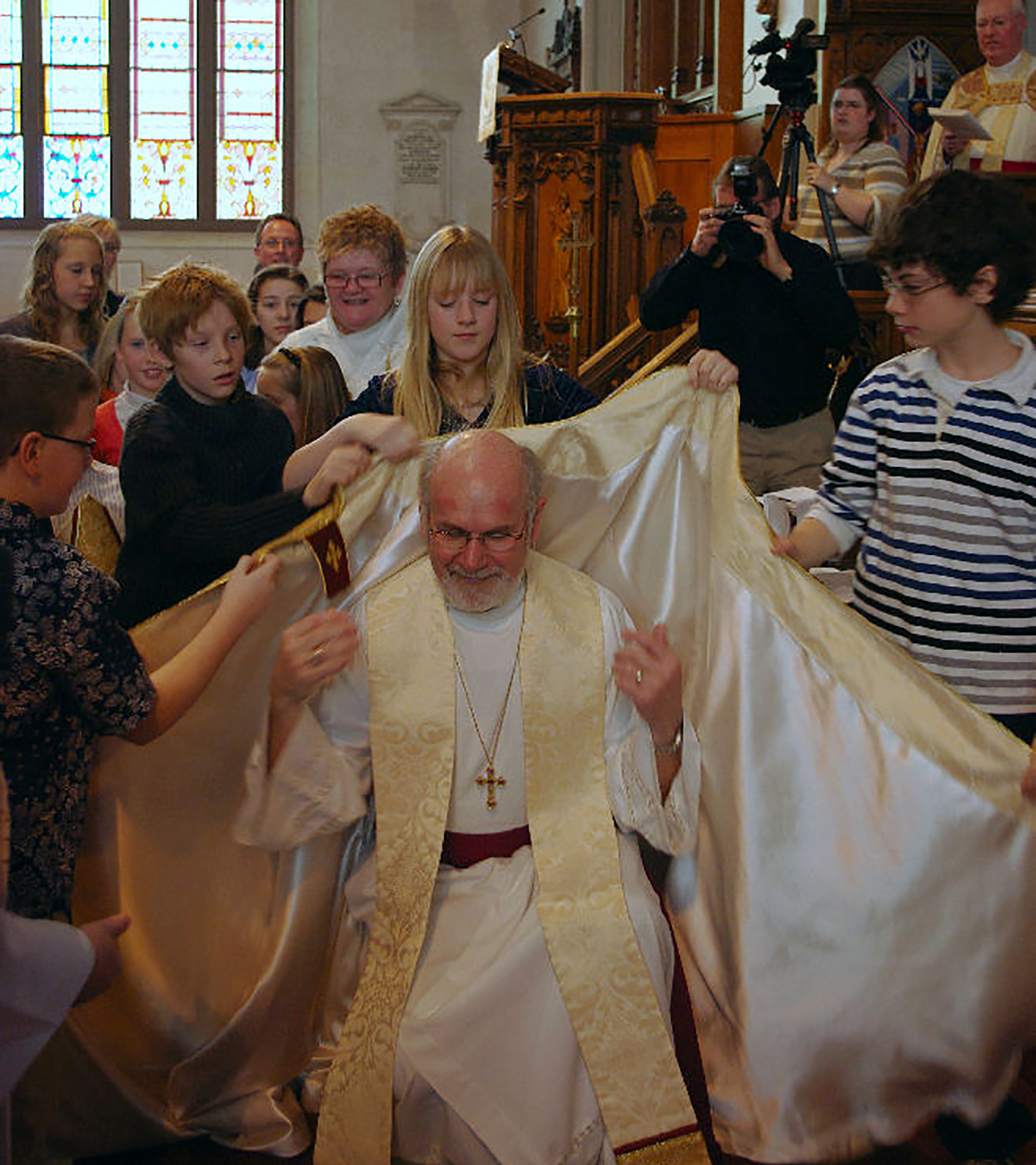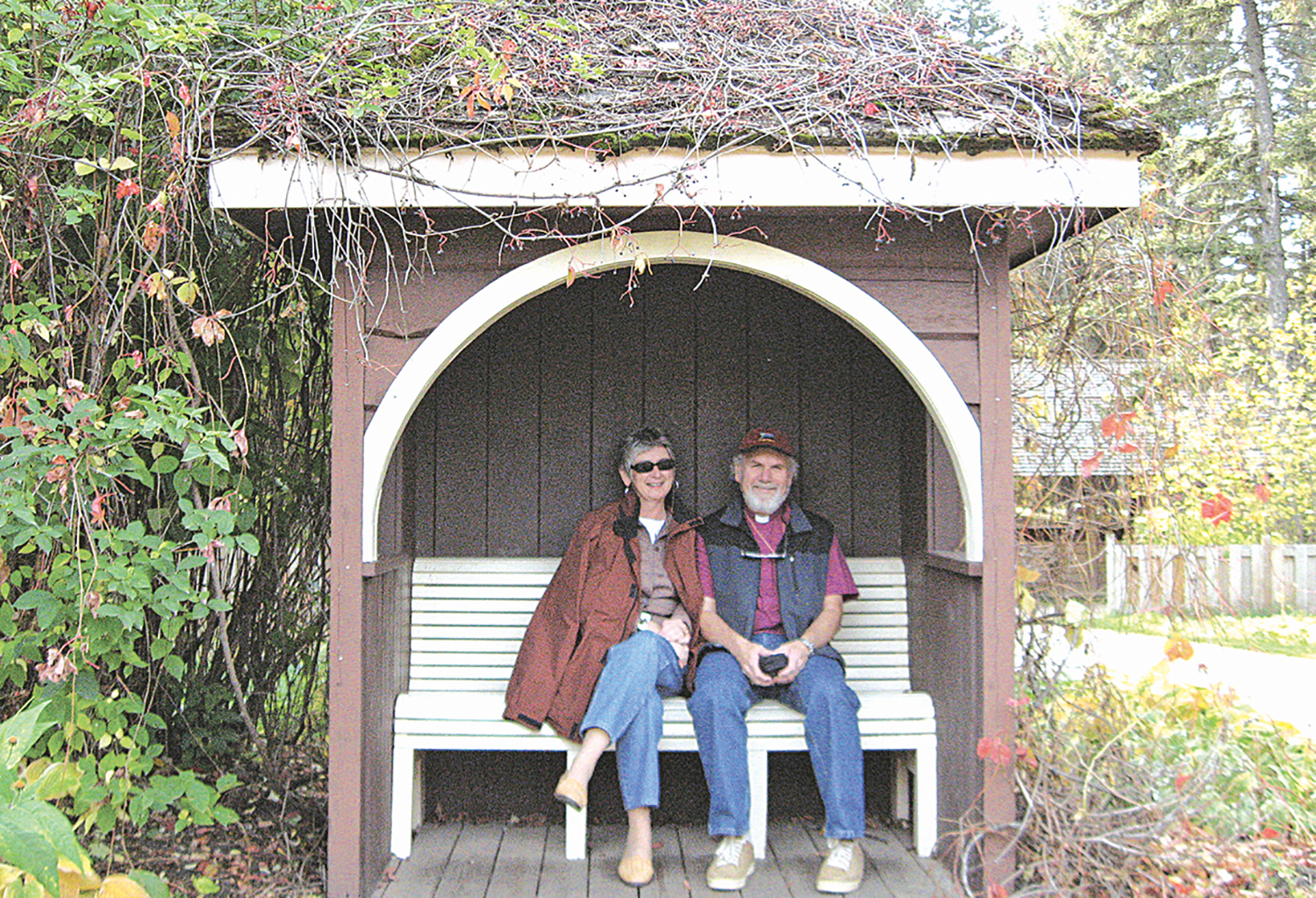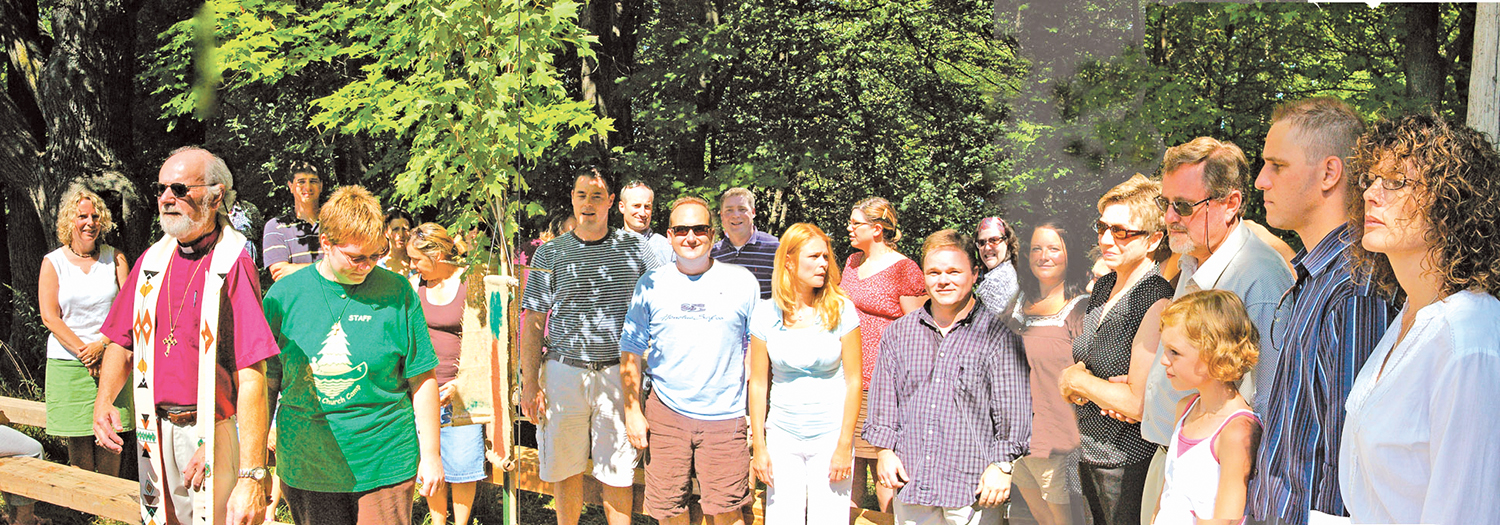.JPG)
Originally posted on October 30, 2016, on the occasion of Bishop Bob's retirement.
By Rev. Canon Keith Nethery
“I had to wrestle with the angel.”
A young man in his early twenties; his father a priest; an undergrad at Huron College that was a lot of fun; a disquiet about his relationship with God. Robert Franklin Bennett was at a crossroads and the decisions he would make next would change his life, and by extension impact on many parishes and people in the Diocese of Huron.
“I wasn’t sure about a call to ministry, but with the encouragement of those around me, I decided to take on the MDiv program and try to figure out where I was going.” Bob says there was never a clear moment when he felt the “call”, but rather a gentle process of discernment as he continued his time in the halls of Huron College.
“I had to figure out the relationship between me, faith, Jesus and the Church.” Along the way the answers came and the student was ready to take the next step and become one of the “young leaders” many of his mentors told him the church was in need of.
Thus came the day. May 1, 1974 in Wallaceburg. Alongside Lavern Jacobs and Irwin Oliver, who would become important colleagues through his time in ministry, Robert Bennett knelt before The Right Reverend David Ragg and was ordained deacon in the Church of God.
“It was just an awesome experience to be ordained by David and the fact that my dad was the preacher made the day just perfect.”
A scant year later, in May of 1975, with a call to Chesley, Paisley and Tara awaiting, this time at Trinity Simcoe, where Bob served as Curate, he again knelt before God and a Bishop who would long be an influence on his life. The Right Reverend Morse Robinson ordained Bob as priest in the Church of God.
“Morse was such a special man. He believed in me when I wasn’t sure that I even believed in myself. His counsel has been essential to me in my life in ministry”, remembers Bob.
Perhaps he didn’t realize it, but the Reverend Bob Bennett was about to enter a relationship that would change him. “I knew I was going to Chesley, Paisley, Tara, but I had no idea that so many of them would drive to Simcoe to be a part of my ordination.” As we all know, Bob enjoyed his time in Bruce County and has shared the odd story about the parish.
And that is where we turn next: to the parish ministries that shared a young priest who would one day become Suffragan and then Diocesan Bishop of Huron.
It took us a while and not just a few tangents, but Bob and I worked our way through a story or two about each of his parishes. I kept hearing the phrase, “Maybe you shouldn’t write this!” as he told story after story of life, love and the odd embarrassing occurrence (hence the maybe you shouldn’t write this). As the stories flowed the smile on Bob’s face grew and the laughter came easy. I’m pretty sure there was a tear or two formed as he told of poignant moments.

The ministry of Robert Franklin Bennett started as curate at Trinity Simcoe, although much of his work was in the communities of Port Ryerse and Woodhouse. It was in Port Ryerse that he did his first funeral.
“I got to the church and I couldn’t get out of the car. I was so nervous I literally couldn’t make myself get out of the car. I learned later that many of the members of the parish saw me sitting there and wondered if I was ever coming inside? I calmed myself and said, ‘Lord make me an instrument of Your Peace’, and suddenly I was able to gather my thoughts, get out of the car and complete my first funeral without further issues.”
The story Bob recalls from Woodhouse, reminds us that it was 1974:
“I recall coming to the church and there, under the trees, every Sunday, the men of the church would be standing smoking. I go into the building and there are all the women, gathering in a circle, telling the stories of the day. It happened that way week after week.”
In early 1975, the Bennett family headed north to Chesley, Paisley and Tara for a five-year stint that would change a young cleric. The clergy of the Diocese have heard, more than once, about how it was these three church communities that taught Bob how to be a priest.
The Bishop remembers a defining moment in the life of the parish, early on in his time of ministry there:“We had a parish weekend at Howdenvale over Labour Day. I didn’t really ask permission, I just invited everyone to come along when we had a chance to get away for a few days. And they all came, and we shared meals and discussions and campfires. It was on that weekend that we identified that the three main needs were: prayer, study and a youth group. I had my mandate and all three were accomplished.”
And now, for something completely different.
From three rural churches, three buildings steeped in tradition and with a history many decades long, came the question from Bishop Robinson: “Bob, how would you like to build a church?”
Thus begins the St. George’s of Forest Hill phase of the Bennett ministry. Bishop Bob recalls: “We were all young together and thus we built community and a church together.”
The church grew quickly and before long featured a wide range of programs and opportunities. But as always, when you build something new, comes a sticky decision or two.
“We didn’t have much money for church furnishings. I wanted to put in chairs, but others wanted pews. I got voted down and we ended up putting in a combination of pews and chairs. And you know it was the right decision!” As the church grew, so too did Bob in his understanding of himself and his role in ministry.
St. Mark’s in Brantford was next on the ministry highway. It was a strong parish with people of all ages. “I couldn’t believe one year on the last Sunday of August when usually church attendance is at its lowest; we had 25 or more kids in Sunday School.”

There are many stories that could be shared from Brantford, but this was the one Bob told with the most gusto and suggested it was a wonderful learning opportunity. “It was Christmas Eve and we had three services and all three were full, I mean to the rafters full. Preaching and celebrating at all three was a bit of a task and at the 11 pm service, I actually said that I was just a little bit tired. John Munroe, a much loved retired Rector was in the congregation as I confessed my fatigue. With a clear and booming voice he proclaimed, ‘We didn’t get tired in my day!’ Everyone laughed and it seemed much easier to finish the service.”
Bob also wanted to point out that St. Mark’s had a BBQ on the Sunday after Labour Day and the mantra was always, “It never rains on BBQ Sunday.” The first couple of years of Bob’s incumbency, it rained. Suddenly the mantra changed to, “It never rains on BBQ Sunday except when Bob Bennett is here!”
In 1991, the Bennetts made what Bob came to think would be his final move, when they journeyed to All Saints in Windsor. “It was Cathedral like, we had all the things most Cathedrals have, the history, the music, the choirs, the special events. But it was also like a small community. Being downtown in Windsor, it was like we all became family, everyone was welcomed and many of our programs involved those who lived around us.”
Bishop Bob recalls his induction as Rector of All Saints. “Admittedly, I was maybe just a little bit trying to show off. It was downright hot, but I insisted on wearing a cope and looking the part of Rector of this majestic church. The service began and as the first reader approached the lectern, they couldn’t be heard. The sexton walked up the aisle, flipped a switch and loudly said into the microphone, ‘Is this thing on!!!’ Suddenly the tension went way, the cope came off, and I sat back and enjoyed becoming part of this community.”
The love affair continued until 2002 when God had other plans.
“It really wasn’t hard to let my name stand. It was expected of the archdeacons to allow themselves to be nominated for bishop. It was in fact my third time.”
“I didn’t expect to be elected. I had never desired to be a bishop, but I had always felt if I was called by the Spirit, through the people of the diocese, I would accept. It was interesting, the day of the election, Kathy asked if she should go. I said there wasn’t any reason for her to be there. Once the election was over, I was called to the front and Bishop Bruce asked if I would like to say something. Panic for a moment as I really didn’t know what to say. In the end I said something to the effect, ‘I believe I have been called to this ministry by God. I will show up and give it everything I’ve got!’” On Holy Cross Day, September 14, 2002, the people of Huron gathered in historic St. Paul’s Cathedral for the consecration of Robert Franklin Bennett as Bishop Suffragan.
“So many things ran through my mind that day. I was very pleased that long-time friend, Archbishop Terry Finlay was the ordaining Bishop. I had a profound sense of unworthiness. I sensed that I was leaving a safe place to take a new path that was unknown. At one point I realized I really don’t know how to be a bishop!”
Bob remembers well the joyful liturgy and the many many friends and colleagues who came to offer prayers and congratulations. But it was a few days later, when a colleague called the office to talk that Bob Bennett truly realized that things had changed.
“He told me: ‘Bob, I suddenly have this profound sense of sadness as our relationship has changed. You are now my Bishop.’ With that I knew that this was a ministry unlike that which I had experienced.”
One of the most difficult days for Bob Bennett was the day his friend and mentor, Bruce Howe retired as Bishop.
“My thoughts and feelings for Bruce were swirling and at the same time I knew that there was somewhat a crisis of leadership in the Diocese as the Canons stated that no one could be elected for a period of time. I ended up being appointed as Administrator of the Diocese, but really had no authority to act on the difficult issues of the day. It was not an easy time for me. The first thing I did was call Percy O’Driscoll, Jack Peck and Bob Townshend, three retired Bishops still living in Huron and asking for their support, guidance and prayer. It was a good decision.”
When the election for Bishop of Huron rolled around, The Right Robert Franklin Bennett was selected by the will of the people through the Holy Spirit to be Bishop.
Two things I remember clearly about the service on the day I was installed as Bishop. I remember the sense of awe as I banged on the Cathedral Door and I remember with ultimate joy the children of the Diocese presenting me with a Cope. Their participation brought life and hope to that day and stirred me to be the best I could be.”>
I asked Bob to describe, in his own words, what it was like to now be the Bishop of Huron. Here are some of his responses.
“I remember Bruce telling me that there is no manual as to how to be a Bishop. I soon recognized there was a significant difference between Suffragan and Diocesan. Now everything went through my office. It was overwhelming. This is a heavy mantle to carry. While parish ministry prepared me for this calling, I came quickly to recognize, that unlike in a parish, as Bishop you don’t have that visible community around you constantly.”
It will be no surprise for you to hear Bob say that there are great days as a Bishop and there are not so great days. When asked about the most exhilarating moment of his time in Episcopacy, Bob responded quickly and then added a second item as well.
“I think the whole Sesquicentennial celebration in 2007 was the highlight for me. I remember saying to Bishop Bruce, ‘Are you sure we can fill the JLC for worship?’ Bruce never waived in his belief in Huron and that the people would respond. It is hard to put words to the feeling of being involved in that service, the procession, the music, the people, the joy, the love! To see that huge picture on the front page of the London Free Press on Monday morning, stirred pride in who we are and what we are doing. I would also have to say that Lambeth 2008 was a major highlight as well.” We will come back to Lambeth in a moment.
Asked what the low point of his ministry as Bishop was, again Bob responded quickly and then, again, added a second note.
“No doubt the St. Aidan’s Windsor struggle was the most difficult for me. I worked hard as Suffragan Bishop to find the right person for the parish. Then, the day we were served papers for the lawsuit at Church House, it hurt. It hurt because I was dealing with people that I had known for many years, that I had shared wonderful moments with. Some of the things that were said in the time of the lawsuit really hurt. It was hard to separate the pastoral and the legal. There was a lot of pain. And that also goes for church closings. So hard for me to do. Especially being part of the services that saw Paisley and Chesley closed. Deep emotions in that.”
There is one part of being a Bishop that we rarely catch a glimpse of. What is it like to be part of the House of Bishops?
“There are some very tense times in the House. There are positions up and down the spectrum on many issues, but they are always positions of integrity. We all see ourselves as servants of the Church called to give leadership in difficult times. Confidentially is one of the key elements in making the relationships work and I think things are working better in the House now than they have in the past. I was always grateful to have first Bruce and then Terry with me at the House of Bishops, as we were able to talk things through after some difficult days. One more thing, after my years in the House of Bishops I want to say just how much I have come to admire our Primate, Fred Hiltz. I just have great respect for him.”
Earlier Bob named Lambeth as one of the highlights of his episcopal ministry and he expands on that now.
“It was just awesome, even with all the tension, it was just awesome. There are so many different cultures and structures, it opens the scope of Anglicanism in a whole new way. In our Bible Study and Indaba groups, I met with Bishops from Japan, Africa, New Zealand and other parts of the world. I couldn’t believe the diversity. The meetings, the liturgy, the social events – it was just wonderful.”
On a lighter note, Bob remarked on the day the official photo was taken. “It was obvious there were people jockeying for positions, trying to get closer to the Archbishop, trying to get in the front row. I’m thinking aren’t we all one. But I guess that is human nature.”

On one part of his ministry, Bob was clear and concise: He didn’t do it alone.
“As I conclude active ministry, I wonder how I could ever have survived without the love and support of Kathie. Clergy spouses do not choose the lifestyle, cannot choose whether to attend church or not and sometimes are squeezed in a role not of their making. Kath has been there through thick and thin, has always remained true to herself while being the anchor of my life and our family. Words can never capture the love and respect I hold for her as my life partner. The future looks good as we journey together in God’s Love.”
That leads us to a discussion of that future. When it comes to the Anglican Church in general, Bishop Bennett says: “I live in hope. Listening to stories from Lambeth make me realize that we are so incredibly diverse. It comes down to if we can listen in context and then walk together. It’s always easy to throw stones from the outside, but once you come inside the discussion, we see what we can do together. One thing is certain, I can never leave my church.”
On a different understanding of the future, I asked Bishop Bob if there was one thing he could snap his fingers and change in Huron. My question caught him a bit off guard. He seemed hesitant at first, but once he got motoring, the vision became clear.
“I guess, I think… yes, it would be to have five to ten million dollars around so that we could do ministry as we want, not just what we can afford. We need to have the resources to do the dream. It’s not about money, but rather about the opportunity to do ministry. Right now in so many places we are just scraping by, we are cutting corners just to survive. If we were properly resourced, we could do so many life-giving things. We could restore curacies instead of sending our newly ordained out into impossible-size parishes with little or no support. If a small, but growing parish needed senior clergy with gifts and skills that could make it a success, we would have the resources to make the appointment. We could train the trainers. There are just so many things that we could do and do well if we had the fiscal ability to do them.”
As of November 1, 2016 Robert Franklin Bennett is on to new and different things. And probably some things will be just the same. He is very clear that he is leaving the Diocese of Huron in good hands, as the Right Reverend Linda Nicholls becomes Bishop of Huron.
“She is wonderful, she has the right set of skills, the right abilities to articulate vision. She will do very well in Huron.”
No doubt she and Bob have had discussions about his time in episcopal ministry. She has heard the stories we have shared here and more.
Bob leaves his role saying he has, “been stretched by what has happened. I have had experiences that I could never have dreamed of. I have travelled the world from Brazil, to South Africa, to England to the Middle East. I have felt the prayers and the love of people in this Diocese and from other parts of the Communion. It has been quite a journey!”
But what of his legacy, what will Bob Bennett leave to the Church, where will his influence be seen and felt?
“That belongs to others to determine. I read a plaque at St. Paul’s Cathedral in London, England that said, ‘My legacy will be articulated by the people, not by me.’ I like that. I have been honoured by the support I have received in ministry as a priest and as a bishop. I believe that I have built on the ministry of Percy and Bruce and perhaps going forward, others will build on the ministry I have done with the people of Huron.”

I had planned one more question. I wanted to end the interview by putting a smile on Bob’s face and on every reader who recognizes the loving poke of the question I would ask. But as is so often the case in ministry, the phone rang, it was an urgent call for the Bishop, which means the stories must end, and tough work that is ministry must continue.
As I left Bob’s office, hearing in his voice love and concern for a situation that had arisen, I was touched by the many faces of ministry. A joyous tale interrupted to a serious discussion. Does it ever go the other way?
Maybe if I share the question, the serious discussion of the end of this piece, might bring to readers’ minds more joyous tales. I planned to ask, “Bob, tell me how many times you have said the words: Let me tell you a story about Chesley, Paisley and Tara?” I didn’t get the answer, but I’m setting the over/under line at 2479. I might suggest you take over!
